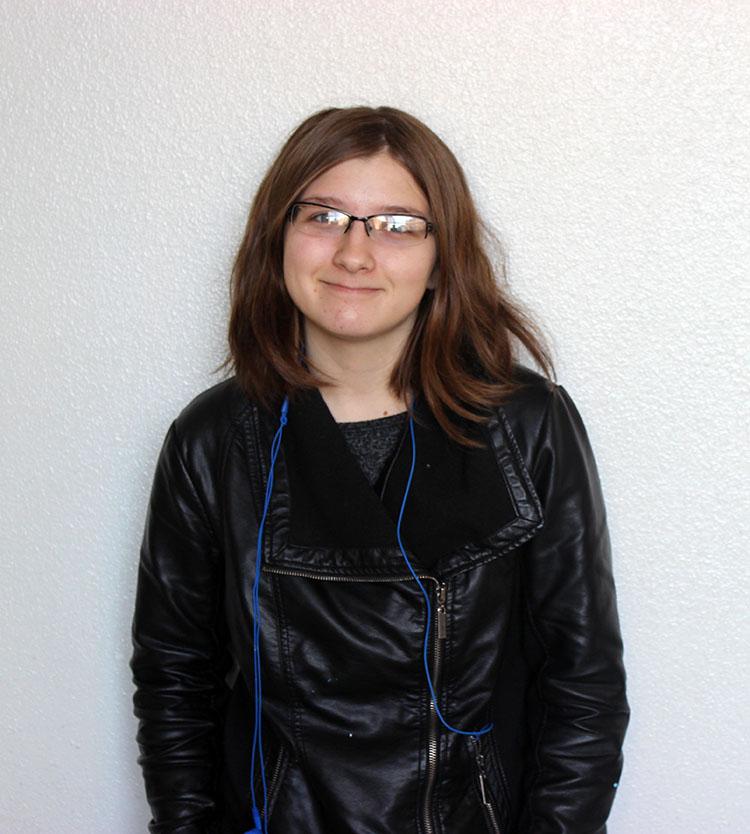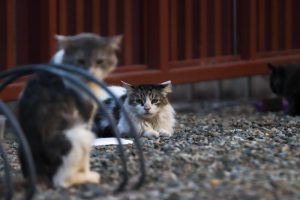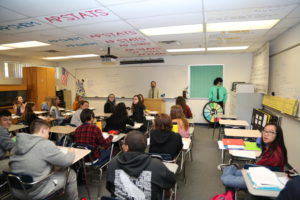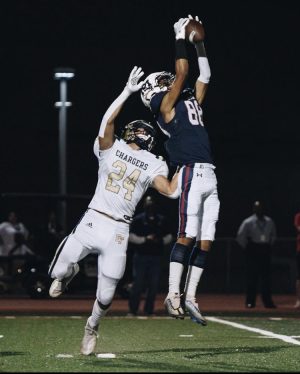The journey for understanding and how cats and grandmas factor in: Jordan Dyer
January 20, 2016
Senior Jordan Dyer began attending McClintock High School at the start of the 2015-2016 school year. In moving schools, caring for cats, having a fascination with communication, and being teased for “grandmotherly” habits, Dyer offers a unique personality and view on life.
Moving schools or even cities can be considered a difficult prospect by some teenagers. The idea of packing up and leaving “everything” behind is often overwhelming for students. For Dyer, however, it’s life.
“I lived in Oklahoma City, Oklahoma for a great deal of my life, spending several weekends out of each year in Mustang, Oklahoma. My sophomore year I moved to Subic Bay, Philippines,” Dyer said. “The summer before my junior year we lived in a cabin in Maine for most of the summer before we moved to Chandler where I spent most of my Junior year before Christmas day when I moved down here.”
Having called six different places “home” over the course of her life, Dyer has seen quite a bit, and every location has its share of unique experiences, as no two places – or schools – are the same.
“I’ve gone to four different high schools by now. Each school’s atmosphere is very distinct,” Dyer said. “I recall that when I moved to Subic Bay I was mostly stunned by the sudden change in elevation and that there were actually mountains around me. Oklahoma is exceedingly flat.”
However, as much as things change, some things stay the same. Subic Bay may be across the globe, but that’s not to say the way people live there is very different from the way people live in Tempe, Arizona.
“Subic Bay was pretty much like any other city in the world where you can go to the mall and get some Starbucks,” Dyer said.
Despite such similarities, though, that isn’t to say that another country doesn’t have something new to offer. Even with a similar way of life, the cultural background of Subic Bay gives everything in the city a new context.
“It was definitely a mesh of different cultures. When we went to see different museums down in Manila it was really interesting to see installments of history where it’s this complete other culture which most Americans are completely unfamiliar with,” Dyer said. “It’s always interesting to realize that there are things in history that exist outside your sphere of influence and aren’t taught to you personally.”
In remembering her experiences living in Subic Bay, Dyer recalls one thing in particular: cats.
“Because my parents taught, we lived at the dorms at school. One time my entire family excepting me went to Manila for Spring Break, and all my teachers went to South Korea for Spring Break. I was put in charge of taking care of all the teachers’ pet cats. So that was interesting,” Dyer said.
Dyer has long held a strong interest in felines and all cat-kind. For a long time, she cared for a pet cat of her own.
“I had a sixteen-year-old cat that passed away a few months ago: Simon. She was a dumpster kitty. We found her on the street when I was about two. My mom brought her in and said, ‘Okay, this is your cat. You have to name her.’ I thought, ‘I am being told what to do; I’m going to do what Simon says; I’m going to name my cat Simon,’” Dyer said.
Dyer cared for Simon for many years, and they were close. However, the care and keeping of a cat does not come immediately to a two-year-old. Learning how to tend to a cat took time, but Dyer learned.
“I was two and I kept wanting to pull her tail,” Dyer said. “I do know that at a certain age I had enough understanding of how cats worked that I could pretty much befriend any stray cat.”
Such a skill can sometimes lead to trouble, though. Dyer’s skill with cats has led to a most unusual scenario: a stray cat in her area has become so determined to have quality time with her that it somehow effects entry into her home on a regular basis.
“I find the cat in my house. The cat has broken into my house and I have no idea why,” Dyer said. “I might have inadvertently adopted this stray cat that breaks into my house.”
Dyer describes her approach to cats as one that takes advantage of a cat’s arrogance. Rather than immediately try to pet or cuddle with a cat, she instead will place distance between herself and the cat. By waiting in such a manner, the cat eventually becomes “insulted” enough that it goes right up to her and initiates the cuddling.
Such easy connection with felines forms a contrast to the difficulty Dyer has had in the past connecting to other people.
“I’m autistic. I really have a terrible time trying to interpret other people’s expressions and their tone of voice. I had no idea why some people wouldn’t want to talk to me or why what I said was insulting. Socializing was always pretty hard for me,” Dyer said.
Fortunately, Dyer’s mother helped her overcome this challenge in her childhood.
“My mom would take me to malls and say, ‘Okay, Jordan, what is that woman feeling right now?’ The woman would be screaming at her husband. ‘I think she’s happy!’ This was the wrong answer,” Dyer said.
Because Dyer had difficulty reading people, she came to these erroneous conclusions naturally and through no fault of her own, making ordinary conversation unusually difficult. To countermand this, Dyer’s mother helped her understand the details of human expression on a more explicit level.
“We would deconstruct the way that the woman was standing or the inflections in her voice and we would kind of pull it all together and say ‘Because she was standing like this and her voice was like this and these things were combined, she is probably feeling like this. And if someone is standing like this and talking like this in the future, this is how you can probably react,’” Dyer said.
Through learning how people emote, Dyer is able to readily understand the other half of a conversation. By observing the body language of others and comparing it to what she knows, she is able to interpret their emotional state accurately and react accordingly.
“I could pull from these deconstructions later, and it’s kind of like a code. ‘If I react in this manner in this event then I can avoid this from happening.’ It doesn’t come naturally to me, but as long as I keep it together like an algorithm that’s constantly running, it works okay. I can socialize with people to a better degree.”
This necessary emphasis on learning the way others communicate silently has influenced her interests later in life. Dyer finds the subject of communication fascinating, and she has some knowledge of multiple languages, including German, Mandarin, and some Tagalog.
“It’s so interesting to see how people communicate with each other because that doesn’t come naturally to me. The idea that people are constantly working to be understood and understand each other is really cool”
Knowing more about communication does not always solve all difficulties experienced in talking to others, though.
“I tend to have a very stoic, stolid expression in place when I’m just resting, so people tend to think I’m predisposed to dislike them,” Dyer said.
Furthermore, Dyer considers herself an introvert. Although she may greatly enjoy the company of friends, that doesn’t mean being with others isn’t sometimes draining in some impalpable way.
“There’s no good way to say that: ‘I’m sorry, but you’re absorbing all my energy right now. It feels like my battery is being drained by you, and I need to leave right now.’ There’s no good way to say that,” Dyer said. “Sometimes I tough it out, especially if I know the person’s kind of sensitive or in a scenario where they need my attention and energy. But otherwise, usually I go ‘Hey, I really need a break. I’m feeling really tired right now.’ And then I proceed to play with the stray cat that breaks into my house.”
Introversion, past difficulties in understanding others, and any other obstacles to communication rarely stop Dyer from doing what she wants to do, though. Even given such hurdles, Dyer still engages in communication-heavy activities such as Speech and Debate, and she performs well.
“I enjoy Speech and Debate for two primary reasons. I enjoy acting and speaking, and the community feels like a family. I think of the members of McClintock’s Speech and Debate team as my friends. Whenever we achieve victory together, I feel a swell of pride that’s nearly overwhelming,” Dyer said. “It’s fascinating to me because I have never before been part of a team that made me feel so determined to succeed, not for my own sake but for the sake of the community.”
This determination to succeed can be said to have led to Dyer’s success in the most recent tournament: the 2015 Arizona Speech and Debate Coaches Association Division I Winter Trophy. This tournament had strict limits on the number of students a team could enter in each event, preventing Dyer from competing in her favored event of Original Oratory, an event focusing on persuasive speaking.
“Instead of giving up, she started a new event and within a week got good enough to make semifinals at the tournament. I think it really shows her perseverance, hard work and dedication, and her passion for Speech and Debate” freshman Harshini Venkatachalam said.
Dyer competed in Prose Interpretation, an acting event, for the first time this season at Winter Trophy and reached semifinals handily, placing second, first, and fifth in the three preliminary rounds. Although she didn’t advance past the semifinal, achieving so much in so little time is already a tremendous accomplishment.
Successes and victories such as those Dyer has experienced do not translate to a finished life with no room for improvement, though, and Dyer continues to challenge herself to better both herself and the world around her day by day. In recognizing what challenges exist, Dyer hopes to make life better for everyone in the future in whatever incremental way she can.
“I find that every day is a battle against pervasive indifference; both my own, and that of society. Whether or not my first impulse is to take a step back and let things run their course, I have a duty to object to wrongs inflicted on those around me. I must also combat my own lethargy and conviction that whatever I do cannot possibly be enough. I try to further understanding in whatever ways I can, and hope that I can do better in the future,” Dyer said.
It is possible this desire to avoid indifference and lethargy contributes to Dyer’s “grandmotherly” tendencies, as described by her peers.
Dyer has a few habits that has led to peers describing her as a “grandma,” most prominently her baking and knitting. Dyer often bakes treats such as cookies, brownies, or pies and shares them liberally with her peers, and knitting clothing such as hats for herself is an enjoyable pastime for her.
“My friends enjoy poking fun at my “grandmotherly” habits. I enjoy knitting, baking desserts for my friends, collecting ugly Winnie-the-Pooh mugs, telling the same stories over and over again, and being a nosy fart who asks if everyone is okay at least seven times before I’m appeased,” Dyer said.
Dyer supposes that her motivation is that she draws happiness from ensuring others feel cared for.
“Feeling understood and validated is extremely important, and if I can make any of my friends feel like someone out there cares about them and that they matter, then I will try my best to do so,” Dyer said.
Furthermore, if Dyer’s goal is to resist being indifferent to others and the world, her peers would say that she has attained that aim.
“She’s the kind of person who could be going through the worst stage in her life and still put your needs and your being okay [ahead] of herself. That’s Jordan,” Venkatachalam said.
As a child, Dyer started out as an individual who found it on some level challenging to communicate and connect without experiencing confusion at others’ reactions. Today, she is skilled in public speaking and emotional performance and is described as being an understanding and caring individual by her peers and friends. Dyer’s journey has been long, and she has come far from where she started. After experiencing so much, one might be tempted to believe that Dyer knows everything, but she acknowledges openly that life has its surprises and there’s still plenty to learn.
“I was walking with my family downtown, after taking the Orbit, and my brother challenged me to a race. While running, I slipped on the concrete and skinned my knee,” Dyer said. “The most notable part of this event, according to my family, was the way I opened my mouth mid-fall and hollered, ‘Should have seen that coming,’ before I even hit the ground.”
Even if Dyer is, after a fashion, simultaneously a world traveler, cat whisperer, great communicator, and grandma, she does not forget to be at least a little fallible.




